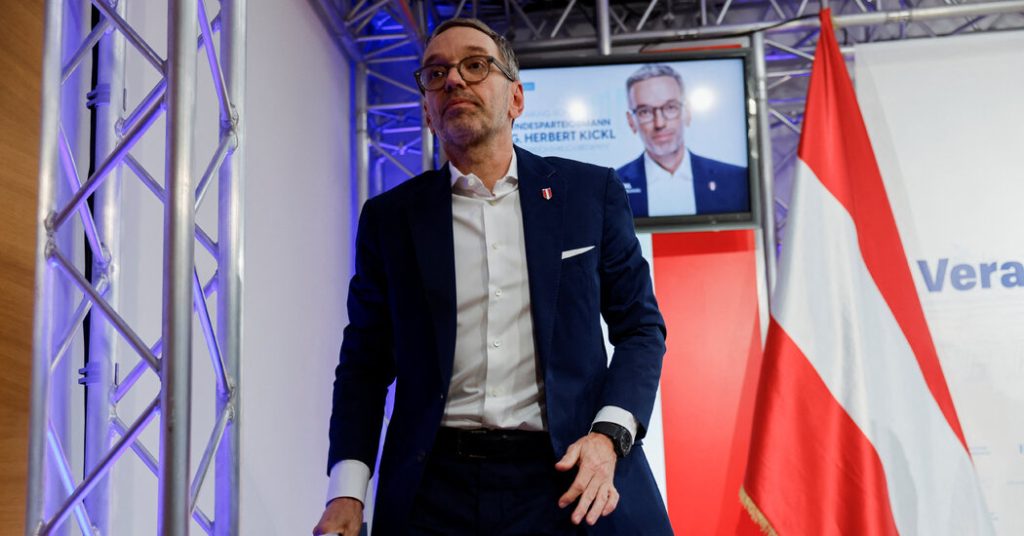The Freedom Party (FPÖ), a far-right political entity in Austria, stands poised to lead the country, marking a significant shift in the European political landscape. The party’s ascent is not unexpected, given the growing acceptance of far-right ideologies in Austria and the decline of the mainstream conservative People’s Party, which has been plagued by scandals and ideological shifts. The FPÖ’s success mirrors the rise of similar parties across Western Europe, signaling a broader trend towards nationalism and populism. This movement has been fueled by economic anxieties, immigration concerns, and skepticism towards established political institutions. The FPÖ’s platform, built on anti-immigrant sentiment, opposition to Covid restrictions, and Euroscepticism, resonates with a segment of the population disillusioned with mainstream politics.
The FPÖ’s history is intertwined with Austria’s complicated relationship with its Nazi past. Founded by former SS members in the 1950s, the party initially struggled to gain mainstream acceptance. However, under the leadership of Jörg Haider, the party adopted a populist, anti-immigrant stance that resonated with a growing segment of the Austrian population, propelling them into the political arena. This focus, further sharpened by current leader Herbert Kickl, has become the driving force of the modern party. Kickl, a former speechwriter for Haider, has employed increasingly provocative slogans, some with disturbing echoes of Nazi-era rhetoric, further solidifying the party’s hardline stance. Despite periods of political ostracization, the FPÖ has repeatedly entered coalition governments, demonstrating its ability to navigate the Austrian political system and secure power. Its participation in government, both at the federal and state level, showcases its enduring influence and the normalization of its once-fringe ideology.
The party’s most recent surge in popularity follows a period of political turmoil in Austria. The People’s Party, which had previously dominated the political landscape, suffered a series of scandals that eroded public trust. This decline, coupled with widespread discontent over inflation and Covid restrictions, created an opening for the FPÖ to capitalize on public dissatisfaction. Their anti-establishment message, coupled with harsh criticism of immigrants, the European Union, and support for Ukraine, resonated with a growing segment of the electorate. This success marks a shift from previous elections where the FPÖ was often seen as a fringe party, to now being a serious contender for leadership. Their appeal has broadened to encompass diverse demographics, including blue-collar workers, university graduates, and notably, women and younger voters. This broader appeal suggests a deeper societal shift in Austria, where far-right ideologies are gaining traction across various segments of the population.
Kickl’s leadership has significantly shaped the party’s trajectory. His rhetoric, often employing inflammatory language and xenophobic slogans, has courted controversy while simultaneously galvanizing support among a specific segment of the Austrian populace. This strategy, though divisive, has proven effective in amplifying the party’s message and attracting voters disillusioned with traditional politics. Kickl’s hardline stance on immigration, including proposals for stricter border controls, forced deportations, and the suspension of asylum rights, resonates with those who perceive immigration as a threat to Austrian identity and security. This stance, while appealing to a certain demographic, raises concerns about human rights and international obligations.
The FPÖ’s resurgence has sparked international concern, particularly among Holocaust survivor groups who view the party’s rhetoric and historical connections with alarm. While the party has attempted to distance itself from its Nazi roots, the use of certain slogans and terminology has evoked a disturbing reminder of Austria’s past. This has fueled concerns that the party’s rise could normalize extremist ideologies and contribute to a climate of intolerance and discrimination. The international community is closely watching Austria’s political developments, with concerns about the potential impact on regional stability and the broader European project. The FPÖ’s Eurosceptic stance and its cozy relationship with Russia add another layer of complexity to its potential leadership.
Despite the FPÖ’s electoral success and the People’s Party’s decline, the path to forming a stable government remains uncertain. The FPÖ will need to negotiate with other parties to secure a majority, a process that could be challenging given the ideological divides and the controversial nature of some of its policies. While its popularity provides leverage, the FPÖ’s hardline stance on key issues like immigration and its Euroscepticism could create friction with potential coalition partners. Moreover, the potential of an FPÖ-led government has triggered alarm bells across Europe,raising serious questions about the future direction of Austrian politics and its place within the European Union.


